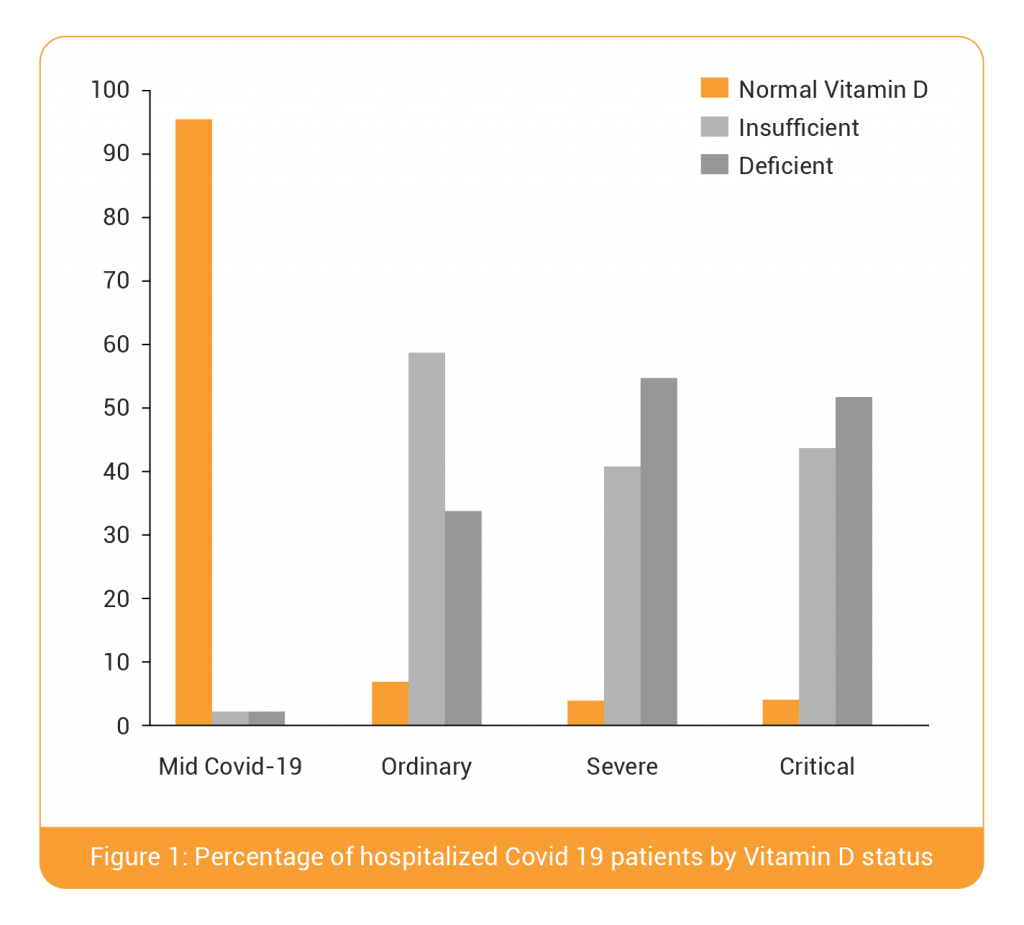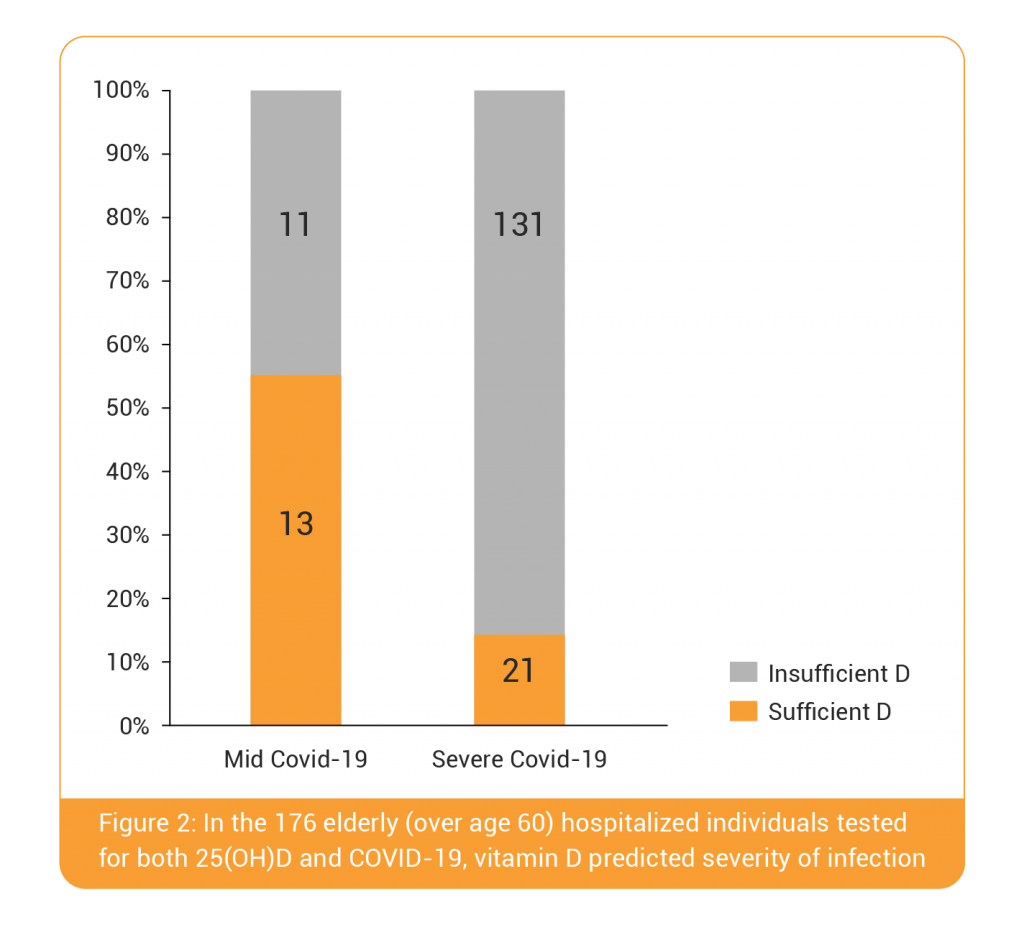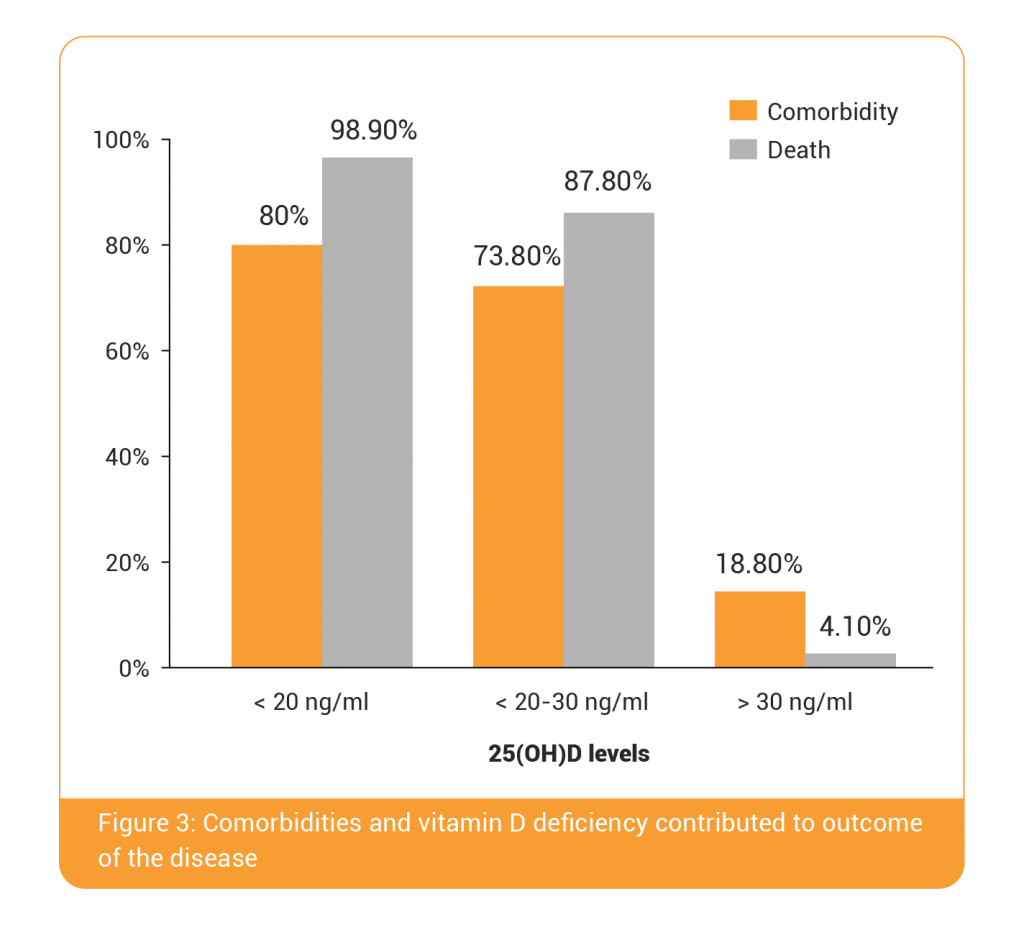Need of Vitamin D supplementation in reducing the risk of COVID-19
As the COVID-19 pandemic remains a major public health threat, the need to understand which populations are high risks of developing severe disease from COVID-19 grows more critical. Immune dysregulation is a key feature of severe COVID-19. Therefore, the restoration of immune balance to prevent the hyper-inflammatory cytokine storm is a reasonable strategy to combat disease severity in COVID-19.
Association between vitamin D and COVID-19
In a fight against the coronavirus, recent studies have found an association between vitamin D and COVID-19 severity and mortality. The University of Chicago Medicine, Illinois, found that “persons tested for COVID-19 would be more likely to test positive for COVID-19 if they had likely deficient vitamin D level”.
In other studies, it was found that the innate immune system is impaired with vitamin D deficiency. The groups who are at highest risk for severe COVID-19 match those who are at highest risk for severe vitamin D deficiency. The pattern of geographical spread of COVID-19 reflects higher population vitamin D deficiency. Vitamin D deficiency increases the X chromosome linked “Renin-Angiotensin” System (RAS) activity, making men more susceptible to ACE2 receptor dysregulation and increased COVID-19 morbidity.

Of the 212 hospitalized COVID-19 patients, a study by Benksin found, over 50% of the patients with severe or critical COVID-19 were vitamin D deficient (level 20ng/ml or lower)(Figure 1).”Vitamin D is important to the function of the immune system and vitamin D supplements have previously been shown to lower the risk of viral respiratory tract infections. Our statistical analysis suggests this may be true for the COVID-19 infection”, David Meltzer stated in the research paper.
Vitamin D supports the production of antimicrobial peptides in the respiratory epithelium, reducing the likelihood of viral infections and decreasing the severity of symptoms. Furthermore, vitamin D upregulates anti-inflammatory mediators, which is vital when considering the hyper-inflammatory immune response caused by COVID-19. These mechanisms suggest that vitamin D-deficient patients may be more susceptible to become infected with COVID-19 and be more likely to develop severe symptoms. For instance, certain demographic groups known to be at high risk for vitamin D deficiency such as elderly, obesity, diabetes, and chronic illness, are at high risk of COVID-19 infection and mortality.
Countries with lower vitamin D status had somewhat higher COVID-19 mortality rates and somewhat lower COVID-19 recovery rates. Backer and Mageswaran evaluated vitamin D deficiency and COVID-19 deaths in 32 countries, the case fatality rates were up to twice as high in countries with high vitamin D deficiency rates.
Scenario of Vitamin D deficiency in India
Surprisingly, in spite of being a country of abundant sunshine, it is noteworthy that a substantial population of India (approximately >70%) are vitamin D deficient (<20 ng/ml). One of the reasons being decreased synthesis of Vitamin D as a consequence of darker skin, use of sunscreen, indoor lifestyle, reduced intake of dietary products rich in Vitamin D, etc. Vitamin D deficiency is highly prevalent in both urban and rural settings, and across all socioeconomic and geographic strata. This deficit amongst urban India may be attributed to avoidance of sunlight and dietary deficiency. Poor diet may also be one of the factors for low vitamin D levels in the Indian population. The situation is no better in rural India where despite plenty of opportunities for exposure to sunlight, the populations nonetheless show prevalence of vitamin D deficiency, possibly attributable to various factors including content of phytates/phosphates in the Indian diet.
![]() Vitamin D deficiency and COVID-19 in high risk groups
Vitamin D deficiency and COVID-19 in high risk groups
Among elderly, vitamin D deficiency is highly prevalent as they produce 75% less cutaneous vitamin D3 than young adults, even with regular sun exposure. As these are some of the more vulnerable populations to developing COVID-19, deficiency might play an important role in vulnerability to the disease. In India, a statistical analysis on the data obtained from the 176 COVID-19 patients 60 years or older finds, over 80% were vitamin D insufficient or deficient, and of those, 72% were male. Insufficient 25(OH)D was found in 86% of severe COVID-19 patients (Figure 2).
Chronic conditions such as cancers, cardiovascular disease, chronic respiratory tract infections, diabetes mellitus, and hypertension are associated with low vitamin D plasma levels. These comorbidities, together with vitamin D deficiency, increase the risk of severe COVID-19 event. According to the Indonesian study, 80% of Vitamin D deficient cases, 73.8% of Vitamin D insufficient cases and 18.8% of cases with normal Vitamin D levels had pre-existing conditions (comorbidity) (Figure 3).
In conclusion, there is a crude relationship between vitamin D deficiency and the number of COVID-19 cases. The ones who are deficit in vitamin D especially older persons aged 60 years or over, males and those with pre-existing conditions are most vulnerable to COVID-19 infection and mortality.


Vitamin D supplementation in “COVID-19 times”
Given that Vitamin D boosts the innate immunity responses, it may have the potential to tame COVID-19 infection and transmission. During the COVID-19 pandemic, an estimation of 25-hydroxyvitamin D should be done in the high-risk, comorbid, and elderly populations who are SARS-CoV-2 positive. Vitamin D supplementation may be considered in such risk groups given that it is relatively inexpensive, safe and is widely available as a supplement.
Majority of researchers recommend vitamin D3 supplements of 1,000 IU−4,000 IU during “COVID-19 times,” with a goal of achieving 25(OH)D levels of 30 ng/ml. “It is hard to say which dose is most beneficial for COVID-19,” Backman said. “However, it is clear that vitamin D deficiency is harmful, and it can be easily addressed with appropriate supplementation. This might be a key to helping protect vulnerable populations. Further studies are needed to determine whether vitamin D supplementation could aid clinical progress in COVID-19 patients.
Meanwhile, there’s a wealth of data that shows the role of micronutrients in supporting the immune system and reduce the risk of infection. Other micronutrients which help the immune system fight off COVID-19 include vitamins C, D and zinc. Boosting the immune system with these micronutrients may be beneficial for vulnerable populations.
References:
Meltzer, David O et al. “Association of Vitamin D Status and Other Clinical Characteristics with COVID-19 Test Results.” JAMA network open vol. 3, 9 e2019722. 1 Sep. 2020, doi:10.1001/jamanetworkopen.2020.19722
Benskin LL. “A Basic Review of the Preliminary Evidence That COVID-19 Risk and Severity Is Increased in Vitamin D Deficiency”, Front. Public Health 8:513. doi: 10.3389/fpubh.2020.00513
Biesalski, H.K. “Vitamin D deficiency and co-morbidities in COVID-19 patients – A fatal relationship?” Nfs Journal vol. 20 (2020): 10–21. doi:10.1016/j.nfs.2020.06.001